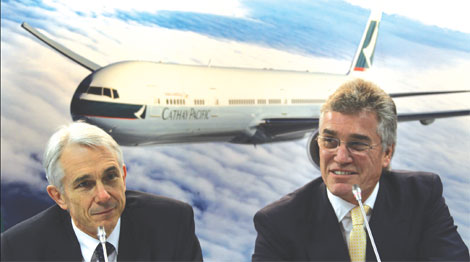Cathy Pacific back in the black
Updated: 2010-03-11 07:35
By Joey Kwok(HK Edition)
|
|||||||||
|
Tony Tyler (left), chief executive officer of Cathay Pacific Airways Ltd and Christopher Pratt, chairman of Cathay Pacific Airways Ltd, are both pleased with the company's HK$4.7 billion profits at their 2009 Result Announcement Press Conference yesterday. Edmond Tang / China Daily |
Net earnings of HK$4.69 billion reverse 2008 loss of HK$8.70 billion
Cathay Pacific Airways, the biggest carrier in Hong Kong, returned to profit in 2009, benefiting from fuel-hedging gains and share sale in a maintenance venture.
Net earnings of Cathay Pacific surged to HK$4.69 billion in 2009, compared to a loss of HK$8.70 billion in 2008.
The airline, meanwhile, posted its best half-year earnings in two years in the second half of 2009 by recording HK$3.9 billion net profit, compared to a loss of HK$7.9 billion a year earlier.
Cathay Pacific will distribute a final dividend of HK$0.10 to its existing shareholders.
Given the rise in fuel prices in the middle of 2009, Cathay Pacific booked mark-to-market gains of HK$2.02 billion from its fuel hedging contracts.
Cathay Pacific, around 42 percent owned by conglomerate Swire Pacific, which reports its profits today, also gained HK$1.25 billion last year from selling 12.45 percent of its stake in Hong Kong Aircraft Engineering Company (HAECO) to Swire.
The Asia's fifth-largest airline by market value made HK$285 million in its 2009 operating profit, excluding fuel-hedging gains, non-recurring items and tax, compared to HK$1.44 billion in the previous year.
Impacted by the decline in passenger and cargo demand amid the economic recession, the airline's revenue dropped 23 percent to HK$67 billion.
"While there was some pick-up in both our passenger and cargo businesses towards the end of the year as the recession began to ease, overall we saw a deep downturn in our key markets, which in turn led to sharply reduced revenues," Christopher Pratt, chairman of Cathay Pacific Airways, said.
The airline's passenger yield, measuring the average sales, fell 19.5 percent last year, because of the decreased number of premium and leisure travelers.
Overall passenger numbers, meanwhile, dropped 1.6 percent to 24.56 million.
Cargo volumes for Cathay Pacific and its subsidiary Dragonair were trimmed 7.1 percent to around 1.53 million tons, while cargo yield also fell 26.8 percent.
"Revenues and yields remain below levels experienced prior to the recent downturn and there has not yet been a sustained improvement in premium passenger demand, which accounts for a high proportion of total revenues," Pratt said.
He added that it is "encouraging" to see that the volume of premium passengers and the prices that they paid in the past four to five months are tracing an upward trend.
Patrick Yiu, managing director of CASH Asset Management, said Cathay Pacific will continue to benefit from the rise in premium passenger numbers amid the global economic recovery.
"Many financial institutions and companies cut their spending on premium travel during the economic recession. The situation will get better this year, as global economy starts to pick up," Yiu said.
In order to reduce operating costs and capital expenditures, Cathay Pacific last year introduced an unpaid leave scheme for its staff.
Tony Tyler, chief executive of Cathay Pacific Airways, said the company will pay a special remuneration, equivalent to three-to-four-weeks of salary, to staff who took unpaid leave last year, in order to reward their "loyalty" to the airline during a difficult time.
He added that all staff received a 1.8 percent increase in salary at the beginning of 2010.
Boosted by the improvement in net earnings, shares in Cathay Pacific yesterday leaped 4.68 percent, or HK$0.68, to close at HK$15.2.
China Daily
(HK Edition 03/11/2010 page3)
